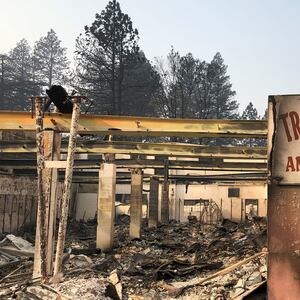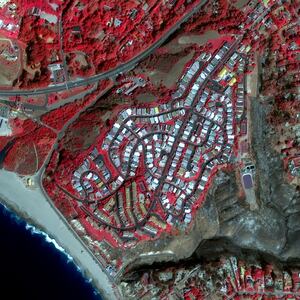CHICO, California—The day the Camp Fire engulfed his home in Paradise, Joe Pickett spent hours narrowly dodging the inferno, fleeing past people burning to their deaths in cars and outside their homes.
“People were just running to save their own,” said 37-year-old Pickett, who was gearing up to go to work as a cook in a local restaurant that morning. “Nobody should see or go through what the majority of us did.”
Pickett spent the following 11 days camped out in the parking lot of the WinCo supermarket in Chico, living with his two dogs and a pet bird in a grey Nissan Xterra. Smoking plenty of marijuana and listening to the car radio has helped pass time as he’s waited to hear if he qualifies for federal disaster aid, he said.
ADVERTISEMENT
“There’s times where I just tear up, and cry for a little while,” said Pickett about living in the SUV he borrowed from his brother. “I was at levels I’ve never been with stress, and just anger and sadness.”
A countless number of the Camp Fire’s initial 52,000 evacuees are likely grappling with the same ordeal as Pickett, and it’s unclear how many are getting mental health care for their trauma.
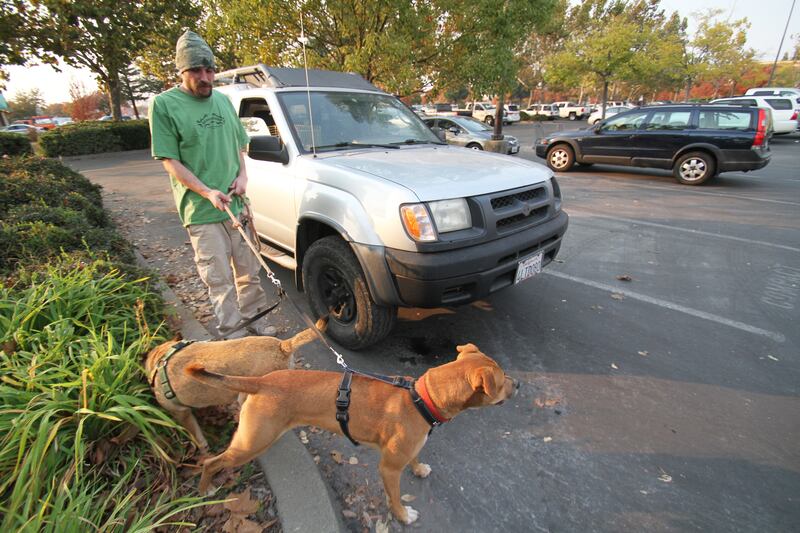
Joe Pickett, 37, lived in a borrowed Nissan Xterra with his two dogs and a pet bird for 11 days after he fled the fire that burned his home in Paradise.
Pauline Bartolone/The Daily BeastSurvivors are burdened by more than just the painful memories of their escape. They’re navigating the stress of displacement. They may be confused about how their property losses will be covered by insurance or buffered by the federal government. None of them are certain about how, when or where, they will set up a permanent home.
As of Tuesday morning, at least 12, 637 homes had been destroyed, and hundreds more commercial buildings were wiped out.
The Camp Fire is California’s deadliest wildfire on record, have killed 79 after it exploded on Nov. 8, 100 miles north of Sacramento. The number of people unaccounted for stood at a daunting 699 as of Tuesday morning.
“It’s more than a disaster, it’s also a mass casualty,” said Ann Looby, an American Red Cross volunteer who is staffing the evacuation shelter at Bidwell Junior High School in Chico, which she says held 70-80 people on Monday.
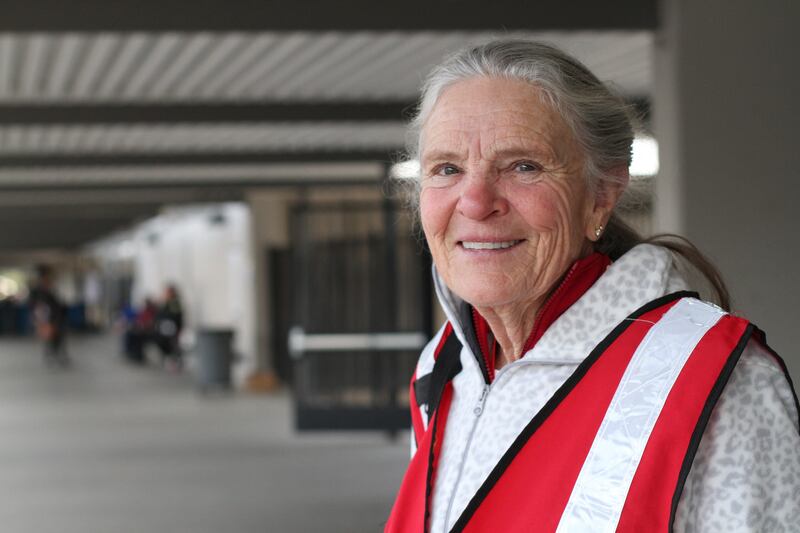
As a volunteer for the American Red Cross, Ann Looby, 74, helps wildfire evacuees talk out their grief at an evacuation center in Chico, California.
Pauline Bartolone/The Daily BeastAs much as she can, Looby’s tending to the mental health needs of the shelter’s temporary residents. With a Ph.D. in psychology, and a warm wrinkly face, 74-year-old Looby roams the outdoor halls of the repurposed middle school, smiling and making small talk with passers-by. She stops to counsel evacuees wherever they are, checking in on grief-stricken survivors that staff or others flag for her.
“Sometimes the kitchen staff says, ‘Somebody came to the line today and was crying, can you talk to them?’” says Looby.
Looby’s job, she says, is to listen to survivors’ stories, and connect them to more permanent support services.
“Every time they tell their story, they heal a little more,” said Looby.
Workers with the Butte County Department of Behavioral Health are dropping in on the shelters to check in on residents who were connected with social services before the fire.
At the Federal Emergency Management Agency’s disaster recovery center in the Chico Mall, evacuees can get psychological support just steps away from where they apply for disaster-related federal cash aid or housing vouchers.
Deborah Laughlin, 63, is currently staying at the Bidwell evacuation shelter after losing everything in the Camp Fire, including her home in Paradise, her psychiatric medication, and even her false teeth.
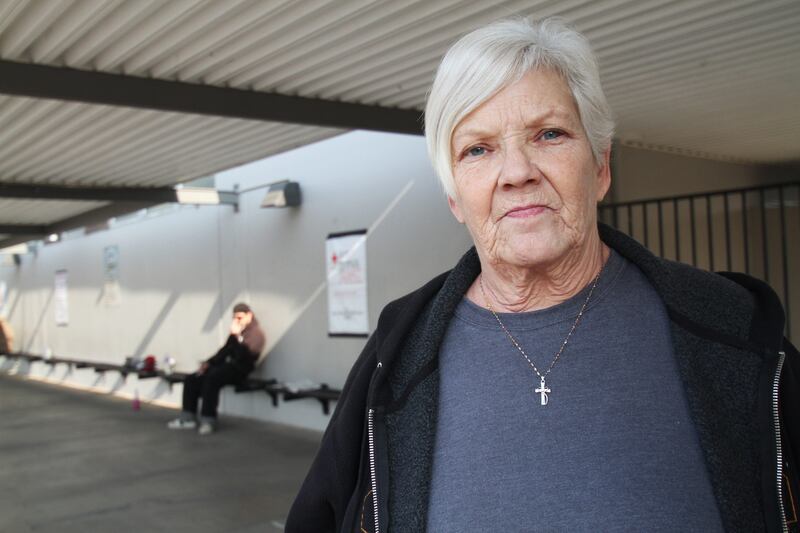
Deborah Laughlin, 63, an evacuee from Paradise, said she has been anxiety-ridden since she arrived at the Bidwell Junior High School evacuation center in Chico, California.
Pauline Bartolone/The Daily BeastShe said she was already dealing with post-traumatic stress before the fire because she was a victim of childhood sexual abuse.
“I thought that I had put it all in my past,” said Laughlin, but any time she deals with a major stressful life event, she said, the past “all comes fluttering back.”
When Laughlin first got to the shelter without her psychiatric medication, she says she lashed out at a visiting doctor, and was “more overwhelmed than a lot of people would be.”
Laughlin, who now recounts her story of misfortune in a calm and matter-of-fact tone, said she’s now more stable because Red Cross workers helped get her medication dispensed and picked up from a nearby pharmacy.
Another Bidwell shelter resident, 27-year-old Chris Stare, is working through his feelings of survivor’s guilt by drawing colorful geometric art on white pieces of paper and handing them out to other evacuees.
“I’m trying to stick to cool colors. I don’t want to remind people too much of the fire with all the reds and the yellows,” he said.
Stare had only recently moved into a friend’s house in Magalia from Oregon six months ago, and didn’t know many people in the area. But he said he feels heartbroken for all the Paradise-area residents who lost the town they worked so hard to build.
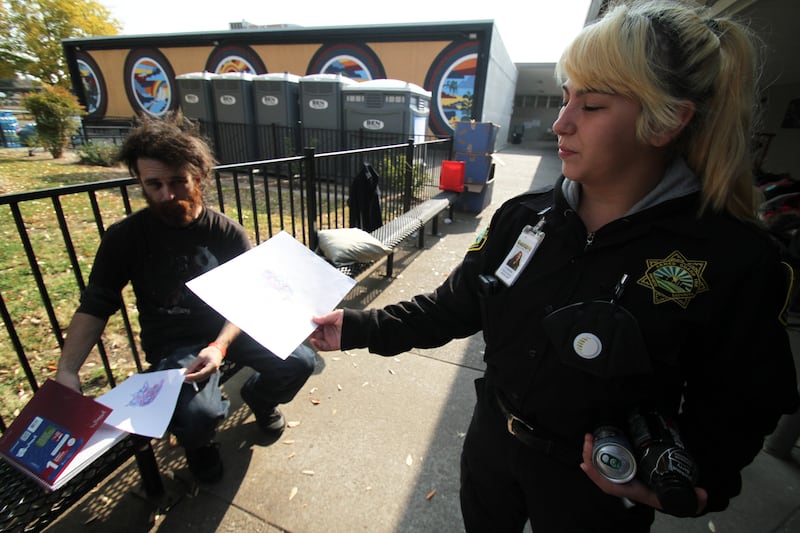
Chris Stare, 27, draws pictures for other evacuees and personnel at the Bidwell Junior High School evacuation center in Chico, California.
Pauline Bartolone/The Daily Beast“Beforehand, I really [didn’t] cherish my life too much” said Stare. “I realize now that the only thing I can do is to try to try to cherish it for those people who lost their lives.”
Although Looby said the Camp Fire is one of the worst disasters she’s seen among the 30 relief efforts she’s staffed for American Red Cross, she’s heartened by the outpouring of support she sees for folks in need.
Survivors find a way to move on, Looby said. “The resilience of people is remarkable.”


